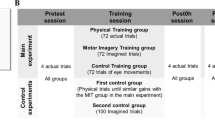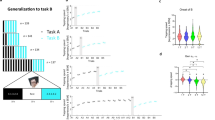Abstract
Recent reports have revealed that motor skill learning is impaired if two skills are practiced one after the other, that is before the first skill has had the time to become consolidated. This suggests that motor skills should be practiced in isolation from one another to minimize interference. At the moment, little is known about the effect of practice schedules high in contextual interference on motor skill consolidation. In Experiment 1, we investigated whether a serial practice schedule impairs motor skill consolidation. Participants had to learn two distinct sequences of finger movements (A and B) under either a blocked practice schedule or a serial practice schedule before being retested the following day. A control group also practiced Sequence A only. Our results revealed that a blocked practice schedule led to no interference between the sequences, whereas a serial practice schedule impaired the consolidation of Sequence B. In Experiment 2, we investigated the origin of the interference caused by a serial practice schedule by replacing the physical practice of Sequence A with either the observation of a model performing Sequence A or by asking participants to produce random finger movements. Our results revealed that both tasks interfered with the consolidation of Sequence B. Thus, we suggest that a serial practice schedule impairs motor skill consolidation through a conflict in the brain networks involved in the acquisition of the cognitive representation of the sequence and its execution.





Similar content being viewed by others
References
Badets A, Blandin Y (2010) Feedback schedules for motor-skill learning: the similarities and differences between physical and observational practice. J Mot Behav 42:257–268
Balas M, Netser S, Giladi N, Karni A (2007a) Interference to consolidation phase gains in learning a novel movement sequence by handwriting: dependence on laterality and the level of experience with the written sequence. Exp Brain Res 180:237–246
Balas M, Roitenberg N, Giladi N, Karni A (2007b) When practice does not make perfect: well-practiced handwriting interferes with the consolidation phase gains in learning a movement sequence. Exp Brain Res 178:499–508
Bays PM, Flanagan JR, Wolpert DM (2005) Interference between velocity-dependent and position-dependent force-fields indicates that tasks depending on different kinematic parameters compete for motor working memory. Exp Brain Res 163:400–405
Blandin Y, Proteau L (2000) On the cognitive basis of observational learning: development of mechanisms for the detection and correction of errors. Q J Exp Psychol 53:846–867
Brashers-Krug T, Shadmehr R, Bizzi E (1996) Consolidation in human motor memory. Nature 382:252–254
Brawn TP, Fenn KM, Nusbaum HC, Margoliash D (2010) Consolidating the effects of walking and sleep on motor-sequence learning. J Neurosci 30:13977–13982
Caithness G, Osu R, Bays P, Chase H, Klassenn J, Kawato M, Wolpert DM, Flanagan JR (2004) Failure to consolidate the consolidation theory of learning for sensorimotor adaptation tasks. J Neurosci 24:8662–8671
Caspers S, Zilles K, Laird AR, Eickhoff SB (2010) ALE meta-analysis of action observation and imitation in the human brain. NeuroImage 50:1148–1167
Cohen DA, Pascual-Leone A, Press DZ, Robertson EM (2005) Off-line learning of motor skill memory: a double dissociation of goal and movement. Proc Natl Acad Sci USA 102:18237–18241
Doyon J, Benali H (2005) Reorganization and plasticity in the adult brain during learning of motor skills. Curr Opin Neurobiol 15:161–167
Dushanova J, Donoghue J (2010) Neurons in primary motor cortex engaged during action observation. Eur J Neurosci 31:386–398
Fischer S, Hallschmid M, Elsner AL, Born J (2002) Sleep forms memory for finger skills. Proc Natl Acad Sci USA 99:11987–11991
Gruetzmacher N, Panzer S, Blandin Y, Shea CH (2011) Observation and physical practice: coding of simple motor sequences. Q J Exp Psychol 64:1111–1123
Hinder MR, Walk L, Wooley DG, Riek S, Carson RG (2007) The interference effects of non-rotated versus counter-rotated trials in visuomotor adaptation. Exp Brain Res 180:629–640
Hirashima M, Nozaki D (2012) Distinct motor plans form and retrieve distinct motor memories for physically identical movements. Curr Biol 22:432–436
Izawa J, Criscimagna-Hemminger SE, Shadmehr R (2012) Cerebellar contributions to reach adaptation and learning sensory consequences of action. J Neurosci 32:4230–4239
Kantak SS, Sullivan KJ, Fisher BE, Knowlton BJ, Winstein CJ (2010) Neural substrates of motor memory consolidation depend on practice structure. Nat Neurosci 13:923–925
Karni A, Meyer G, Jezzard P, Adams MM, Turner R, Ungerleider LG (1995) Functional MRI evidence for adult motor cortex plasticity during motor skill learning. Nature 377:155–158
Kim T, Rhee J-H, Wright DL (2016) Allowing time to consolidate knowledge gained through random practice facilitates later novel motor sequence acquisition. Acta Psychol 163:153–166
Kleim JA, Hogg TM, VanderBerg PM, Cooper NR, Bruneau R, Remple M (2004) Cortical synaptogenesis and motor map reorganization occur during late, but not early, phase of motor skill learning. J Neurosci 24:628–633
Korman M, Raz N, Flash T, Karni A (2003) Multiple shifts in representation of a motor sequence during the acquisition of skilled performance. Proc Natl Acad Sci USA 100:12492–12497
Krakauer JW, Shadmehr R (2006) Consolidation of motor memory. Trends Neurosci 29:58–64
Krakauer JW, Ghilardi MF, Ghez C (1999) Independent learning of internal models for kinematic and dynamic control of reaching. Nat Neurosci 2:1026–1031
Krakauer JW, Ghez C, Ghilardi MF (2005) Adaptation to visuomotor transformations: consolidation, interference, and forgetting. J Neurosci 25:473–478
Kuriyama K, Stickgold R, Walker MP (2004) Sleep-dependent learning and motor-skill complexity. Learn Mem 11:705–713
Larssen BC, Ong NT, Hodges NJ (2012) Watch and learn: seeing is better than doing when acquiring consecutive motor tasks. PLoS One 7:e38938
Lee TD (2012) Contextual interference: generalizability and limitations. Skill acquisition in sport: research, theory and practice, 2nd edn. Routledge, New York, pp 79–93
Lee TD, Magill RA (1983) The locus of contextual interference in motor-skill acquisition. J Exp Psychol Learn Mem Cogn 9:730–746
Lohse KR, Wadden K, Boyd LA, Hodges NJ (2014) Motor skill acquisition across short and long time scales: a meta-analysis of neuroimaging data. Neuropsychologia 59:130–141
Mazzoni P, Krakauer JW (2006) An implicit plan overrides an explicit strategy during visuomotor adaptation. J Neurosci 26:3642–3645
McGaugh JL (2000) Memory—a century of consolidation. Science 287:248–251
Muellbacher W, Ziemann U, Wissel J, Dang N, Kofler M, Facchini S, Boroojerdi B, Poewe W, Hallet M (2002) Early consolidation in human primary motor cortex. Nature 415:640–644
Ong NT, Hodges NJ (2010) Absence of after-effects for observers after watching a visuomotor adaptation. Exp Brain Res 205:325–334
Ong NT, Larssen BC, Hodges NJ (2012) In the absence of physical practice, observation and imagery do not result in updating of internal models for aiming. Exp Brain Res 218:9–19
Osu R, Hirai S, Yoshioka T, Kawato M (2004) Random presentation enables subjects to adapt to two opposing forces on the hand. Nat Neurosci 7:111–112
Pascual-Leone A, Grafman J, Hallett M (1994) Modulation of cortical motor output maps during development of implicit and explicit knowledge. Science 263:1287–1289
Penhune VB, Steele CJ (2012) Parallel contributions of cerebellar, striatal and M1 mechanisms to motor sequence learning. Behav Brain Res 226:579–591
Rizzolatti G, Craighero L (2004) The mirror-neuron system. Annu Rev Neurosci 27:169–192
Robertson EM (2009) From creation to consolidation: a novel framework for memory processing. PLoS Biol 7:e1000019
Robertson EM, Pascual-Leone A, Miall RC (2004) Current concepts in procedural consolidation. Nat Rev Neurosci 5:576–582
Robertson EM, Press DZ, Pascual-Leone A (2005) Off-line learning and the primary motor cortex. J Neurosci 25:6372–6378
Rohbanfard H, Proteau L (2011) Learning through observation: a combination of expert and novice models favors learning. Exp Brain Res 215:183–197
Sanes JN, Donoghue JP (2000) Plasticity and primary motor cortex. Annu Rev Neurosci 23:393–415
Schmidt RA, Lee TD (2005) Motor control and learning: a behavioral emphasis, 4th edn. Human Kinetics, Champaign
Shadmehr R, Holcomb HH (1999) Inhibitory control of competing motor memories. Exp Brain Res 126:235–251
Shadmehr R, Smith MA, Krakauer JW (2010) Error correction, sensory prediction, and adaptation in motor control. Annu Rev Neurosci 33:89–108
Shea JB, Morgan RL (1979) Contextual interference effects on the acquisition, retention, and transfer of a motor skill. J Exp Psychol 5:179–187
Song S, Sharma N, Buch ER, Cohen LG (2012) White matter microstructural correlates of superior long-term skill gained implicitly under randomized practice. Cereb Cortex 22:1671–1677
Stickgold R, Walker MP (2007) Sleep-dependent memory consolidation and reconsolidation. Sleep Med 8:331–343
Tabacknick BG, Fidell LS (2007) Using multivariate statistics, 5th edn. Allyn and Bacon, New York
Tibi R, Eviatar Z, Karni A (2013) Fact retrieval and memory consolidation for a movement sequence: bidirectional effects of “unrelated” cognitive tasks on procedural memory. PLoS One 8:e80270
Trempe M, Proteau L (2012) Motor skill consolidation. In: Hodges N, Williams MA (eds) Skill acquisition in sport: research, theory and practice, 2nd edn. Routledge, New York, pp 192–210
Trempe M, Sabourin M, Rohbanfard H, Proteau L (2011) Observation learning versus physical practice leads to different consolidation outcomes in a movement timing task. Exp Brain Res 209:181–192
van Beers RJ, Wolpert DM, Haggard P (2002) When feeling is more important than seeing in sensorimotor adaptation. Curr Biol 12:834–837
Verwey WB, Groen EC, Wright DL (2016) The stuff that motor chunks are made of: spatial instead of motor representations? Exp Brain Res 234:353–366
Walker MP (2005) A refined model of sleep and the time course of memory formation. Behav Brain Sci 28:51–104
Walker MP, Brakefield T, Morgan A, Hobson JA, Stickgold R (2002) Practice with sleep makes perfect: sleep dependent motor skill learning. Neuron 35:205–211
Walker MP, Brakefield T, Hobson JA, Stickgold R (2003) Dissociable stages of human memory consolidation and reconsolidation. Nature 425:616–620
Walker MP, Stickgold R, Alsop D, Gaab N, Schlaug G (2005) Sleep-dependent motor memory plasticity in the human brain. Neuroscience 133:911–917
Wilde H, Magnuson C, Shea CH (2005) Random and blocked practice of movement sequences. Res Q Exerc Sport 76:416–425
Wright D, Verwey W, Buchanen J, Chen J, Rhee J, Immink M (2016) Consolidating behavioral and neurophysiologic findings to explain the influence of contextual interference during motor sequence learning. Psychon Bull Rev 23:1–21
Wymbs NF, Grafton ST (2009) Neural substrates of practice structure that support future off-line learning. J Neurophysiol 102:2462–2476
Acknowledgement
This work was supported by an Undergraduate Student Research Award provided by the Natural Sciences and Engineering Research Council of Canada (KM Neville).
Author information
Authors and Affiliations
Corresponding author
Rights and permissions
About this article
Cite this article
Neville, KM., Trempe, M. Serial practice impairs motor skill consolidation. Exp Brain Res 235, 2601–2613 (2017). https://doi.org/10.1007/s00221-017-4992-6
Received:
Accepted:
Published:
Issue Date:
DOI: https://doi.org/10.1007/s00221-017-4992-6




